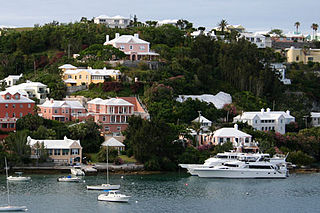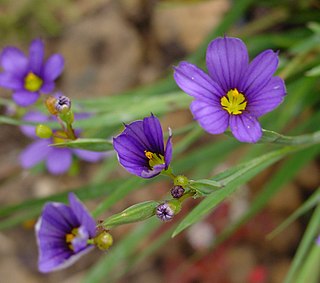
Bermuda is a British Overseas Territory in the North Atlantic Ocean. It is approximately 1,070 km (665 mi) east-southeast of Cape Hatteras, North Carolina; 1,236 km (768 mi) south of Cape Sable Island, Nova Scotia; and 1,759 km (1,093 mi) northeast of Cuba. The capital city is Hamilton. Bermuda is self-governing, with its own constitution and government and a Parliament which makes local laws. The United Kingdom retains responsibility for defence and foreign relations. As of July 2018, it has a population of 71,176, making it the most populous of the British overseas territories.

Bermuda was originally discovered in 1503 by Spanish explorer Juan de Bermúdez. In 1609, the English Virginia Company, which had established Jamestown in Virginia two years earlier, permanently settled Bermuda in the aftermath of a hurricane, when the crew and passengers of Sea Venture steered the ship onto the surrounding reef to prevent it from sinking, then landed ashore. Bermuda's first capital, St. George's, was established in 1612.

A privateer is a private person or ship that engages in maritime warfare under a commission of war. Since robbery under arms was a common aspect of seaborne trade, until the early 19th century all merchant ships carried arms. A sovereign or delegated authority issued commissions, also referred to as a letter of marque, during wartime. The commission empowered the holder to carry on all forms of hostility permissible at sea by the usages of war. This included attacking foreign vessels and taking them as prizes, and taking prize crews as prisoners for exchange. Captured ships were subject to condemnation and sale under prize law, with the proceeds divided by percentage between the privateer's sponsors, shipowners, captains and crew. A percentage share usually went to the issuer of the commission.

Bermuda is an overseas territory of the United Kingdom in the North Atlantic Ocean. Located off the east coast of the United States, it is situated around 1,770 km (1,100 mi) northeast of Miami, Florida and 1,350 km (840 mi) south of Halifax, Nova Scotia, west of Portugal, northwest of Brazil, 1,759 km (1,093 mi) north of Cuba and north-northeast of Puerto Rico. The nearest landmass is Cape Hatteras, North Carolina, about 1,030 km (640 mi) west-northwest. Although commonly referred to in the singular, the territory consists of approximately 138 islands, with a total area of 57 km2 (22 sq mi).

The Bermuda sloop is a type of fore-and-aft rigged single-masted sailing vessel developed on the islands of Bermuda in the 17th century. Such vessels originally had gaff rigs with quadrilateral sails, but evolved to use the Bermuda rig with triangular sails. Although the Bermuda sloop is often described as a development of the narrower-beamed Jamaica sloop, which dates from the 1670s, the high, raked masts and triangular sails of the Bermuda rig are rooted in a tradition of Bermudian boat design dating from the earliest decades of the 17th century. It is distinguished from other vessels with the triangular Bermuda rig, which may have multiple masts or may not have evolved in hull form from the traditional designs.

A Bermuda rig, Bermudian rig, or Marconi rig is a configuration of mast and rigging for a type of sailboat and is the typical configuration for most modern sailboats. This configuration was developed in Bermuda in the 17th century; the term Marconi, a reference to the inventor of the radio, Guglielmo Marconi, became associated with this configuration in the early 20th century because the wires that stabilize the mast of a Bermuda rig reminded observers of the wires on early radio masts.

Sir Thomas Dale was an English naval commander and deputy-governor of the Virginia Colony in 1611 and from 1614 to 1616. Governor Dale is best remembered for the energy and the extreme rigour of his administration in Virginia, which established order and in various ways seems to have benefited the colony, although he was criticised for high-handedness. He is also credited with the establishment of Bermuda Hundred, Bermuda Cittie, and the Cittie of Henricus.

The flora and fauna of Bermuda form part of a unique ecosystem due to Bermuda's isolation from the mainland of North America. The wide range of endemic species and the islands form a distinct ecoregion, the Bermuda subtropical conifer forests.

Spittal Pond Nature Reserve is the largest wildlife sanctuary in Bermuda, located close to the Atlantic coast of Smith's Parish. Surrounding the third largest pond in Bermuda, Spittal Pond, it covers an area of 60 acres (24 ha). It is one of 13 parks or reserves managed by the Bermuda Department of Conservation Services which protects and conserves environmentally critical areas and habitats. The pond reserve, a wetland site, is one of the seven Ramsar Sites in Bermuda, which was approved on 10 May 1999 for the criteria of its unique characteristics such as its lagoon which is permanently brackish, ecology featuring wet grassland and mangrove forests, seasonal shorebirds, other ver run waterbirds and European eels. It is also home to many types of species mostly including birds.
Captain William Sayle was a prominent American landholder who was Governor of Bermuda in 1643 and again in 1658. As an Independent in religion and politics, and an adherent of Oliver Cromwell, he was dissatisfied with life in Bermuda, and so founded the company of the Eleutheran Adventurers who became the first settlers of the Bahamas between 1646 and 1648. He later became the first governor of colonial South Carolina from 1670 to 1671.

A sweet onion is a variety of onion that is not pungent. Their mildness is attributable to their low sulfur content and high water content when compared to other onion varieties.

HMD Bermuda was the principal base of the Royal Navy in the Western Atlantic between American independence and the Cold War. Bermuda had occupied a useful position astride the homeward leg taken by many European vessels from the New World since before its settlement by England in 1609. French privateers may have used the islands as a staging place for operations against Spanish galleons in the 16th century. Bermudian privateers certainly played a role in many Imperial wars following settlement. Despite this, it was not until the loss of bases on most of the North American Atlantic seaboard threatened Britain's supremacy in the Western Atlantic that the island assumed great importance as a naval base. In 1818 the Royal Naval Dockyard, Bermuda officially replaced the Royal Naval Dockyard, Halifax as the British headquarters for the North America and West Indies Station.
Bermuda Militia, under Militia Acts 1687–1813. Although the Bermuda Parliament had been formed in 1620, prior to 1687, the Bermudian Militia was raised and organised without reference to a Militia Act. The Crown took over the administration of the Colony from The Somers Isles Company in 1684.

The architecture of Bermuda has developed over the past four centuries. The archipelago's isolation, environment, climate, and scarce resources have been key driving points, though inspiration from Europe, the Caribbean and the Americas is evident. Distinctive elements appeared with initial settlement in the early 17th century, and by the second half of that century features that remain common today began to appear.

The Bermuda Fitted Dinghy is a type of racing-dedicated sail boat used for competitions between the yacht clubs of Bermuda. Although the class has only existed for about 130 years, the boats are a continuance of a tradition of boat and ship design in Bermuda that stretches back to the earliest decades of the 17th century.

The following is an alphabetical list of topics related to the British Overseas Territory of the Bermuda Islands.

The Bermuda Garrison was the military establishment maintained on the British Overseas Territory of Bermuda by the regular British Army, and its local militia and voluntary reserves from 1701 to 1957. The garrison evolved from an independent company, to a company of Royal Garrison Battalion during the American War of Independence, and a steadily growing and diversifying force of artillery and infantry with various supporting corps from the French Revolution onwards. During the American War of Independence, the garrison in Bermuda fell under the military Commander-in-Chief of North America. Subsequently, it was part of the Nova Scotia Command until 1868, and was an independent Bermuda Command from then 'til its closure in 1957.

The Historic Town of St George and Related Fortifications is the name used by the United Nations Educational, Scientific and Cultural Organization's (UNESCO) World Heritage Committee to identify collectively as a World Heritage site St. George's Town, founded in 1612, and a range of fortifications, batteries, and magazines built between 1612 and 1939, the last of which was removed from use in 1953.

Sisyrinchium bermudiana, known as Bermudiana or, along with other members of the genus, as blue-eyed-grass, is a flower of the genus Sisyrinchium that is indigenous to the Atlantic archipelago, and British Overseas Territory, of Bermuda. The plant appears and blooms in the spring. It has been used as a totemic flower by Bermudians, and appears in art, jewellery, banknotes and elsewhere. Long believed to be limited to Bermuda, the plant has also been found around Lough Erne and Lough Melvin in County Fermanagh, Northern Ireland, where it is known as feilistrín gorm, or blue-eyed grass.
















